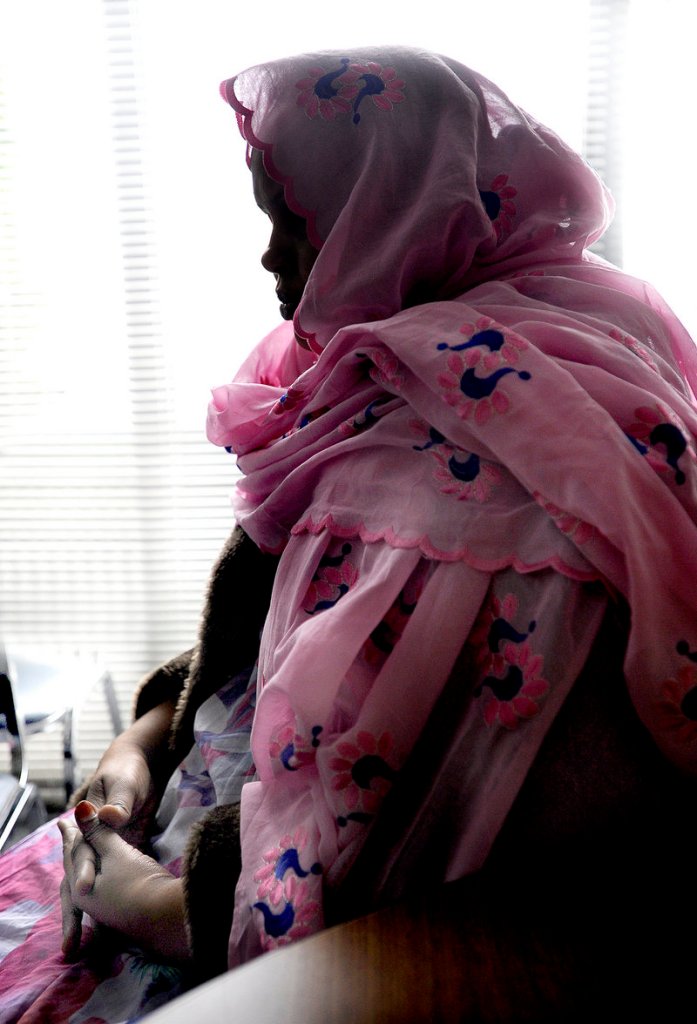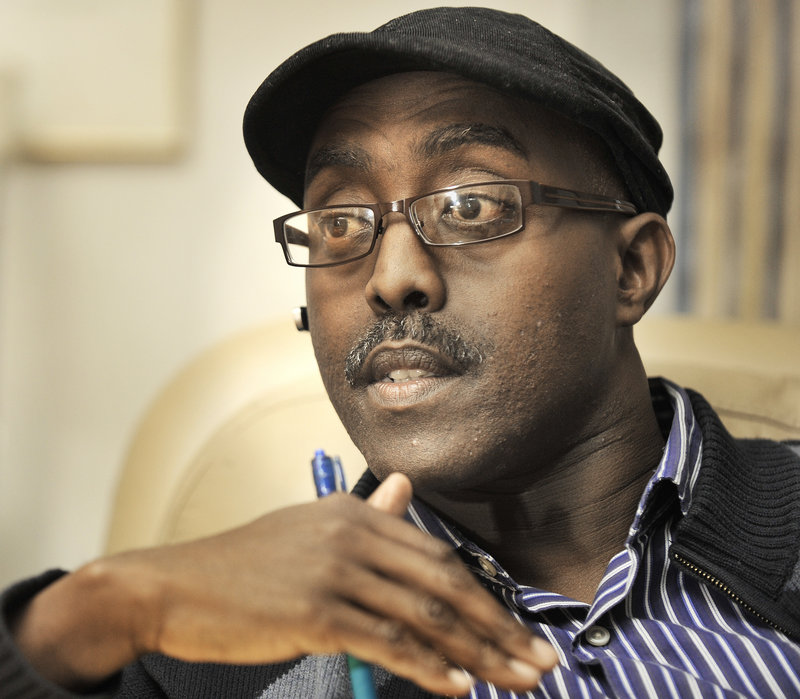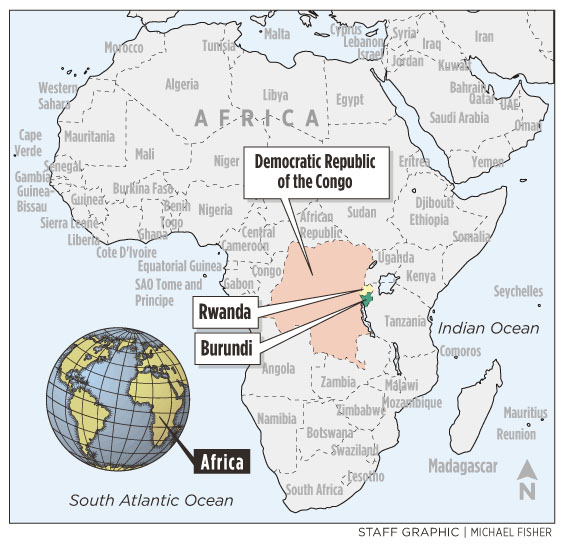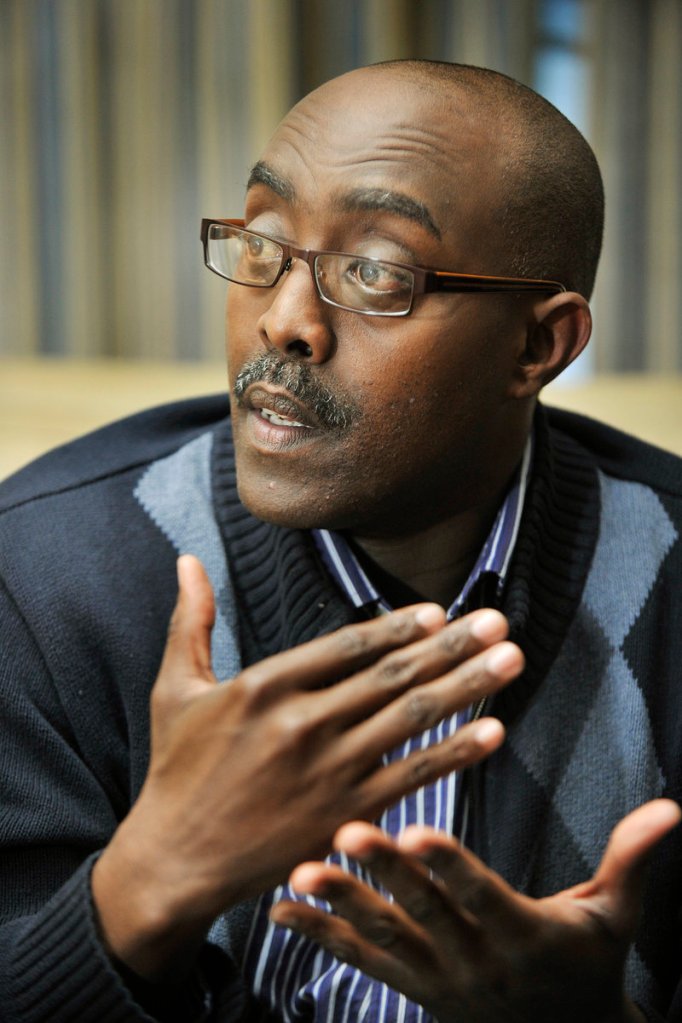PORTLAND — Just over two years ago, Alain Jean Claude Nahimana, 41, was a wealthy and influential man in Burundi, a tiny nation in central Africa. The son of one of the country’s former ambassadors to Switzerland, he owned a public relations firm and had been a leader in the ruling political party.
Political and ethnic conflicts, however, drove him out of the party. After setting up a website critical of government corruption, he was arrested, beaten and tortured, he says. After his release, he went into hiding.
In February 2010, he fled to America and applied for asylum. Still, for many months afterward, even the noise of diesel engines at night would frighten him. The engines sounded like the Toyota pickup trucks that carried the police who arrested him.
“It took me many months to feel I am not in Burundi but in the United States and that I am safe,” he said.
Nahimana belongs to a new wave of immigrants – people from central Africa seeking asylum because they fear for their lives in their native countries. It is the fastest-growing immigrant group in Portland.
They come primarily from three counties: Burundi, Rwanda and the eastern region of the Democratic Republic of the Congo, all former colonies of Belgium.
In addition, there’s a small population of asylum-seekers from Djibouti, a former French colony located on Africa’s northeastern coast. Most of those from Djibouti who immigrated to Maine have settled in Lewiston.
No one knows how many of these new immigrants live in Portland. Some leaders in the community say there are nearly 1,000, and city officials who help immigrants say that estimate could be accurate.
Refugees from Somalia – who were first resettled in Portland in the 1990s after the Somali Civil War – remain by far the largest group of African immigrants in the city, at about 5,000. Immigrants from Sudan, who came in the next wave, are the second largest, at roughly 3,000.
Immigrants from central Africa began arriving in Portland in significant numbers two years ago.
Some, such as Nahimana, say the General Assistance Program is among the main reasons they have moved to Portland. Others say they came here because they know friends or relatives who are here, and they are told the city is a safe place for their families.
In fiscal 2009, only a handful of asylum-seekers applied for General Assistance, a program funded by both the state and the city to help the indigent. In the first eight months of fiscal 2012, the city had 178 cases of asylum-seekers, representing 269 people.
NEW IMMIGRANT WAVE IS DIFFERENT
Unlike Somalis and Sudanese, who lived in refugee camps abroad for years before being resettled in the United States as part of a federal program, these new immigrants are coming here on their own.
That means they have the money and social status to obtain a visa and travel to America. For example, they might get a visa to attend an academic conference.
Many are well-educated and had worked as professionals or had owned businesses. Still, while they may be affluent in Africa, their incomes are meager compared to those of Americans, and they quickly use up their savings after arriving here.
Unlike refugees, they don’t get much support once they are here.
They do not qualify for any federally funded assistance programs, such as welfare, food stamps or Section 8 housing vouchers. A year ago, Gov. Paul LePage removed their eligibility from MaineCare. They can only be eligible after being granted asylum.
Immigrants seeking asylum can’t work immediately. They must wait 150 days before receiving an employment authorization card.
The only program that helps them is General Assistance, which provides vouchers for necessities, such as food and housing, up to $812 per person per month for someone who has no income.
Maine is one of only 12 states that provide General Assistance benefits to childless adults who do not have some disability, according to the Center on Budget Policy Priorities, a left-leaning think tank.
The city’s General Assistance budget increased from $6.6 million in 2010 to $6.8 million in 2011. The state pays about 75 percent of the cost and the city pays the rest. The LePage administration is proposing cuts to the program, resulting in Portland taxpayers shouldering a bigger share of the costs.
City officials could not say what proportion of the increase is due to cases of asylum-seekers. Doug Gardner, director of Portland’s Health and Human Services Department, said the costs are small compared with the total budget and that rising rents are the primary reason for the increase. The city provides vouchers to help poor people pay their rent.
Portland also provides specialized training for social workers, caseworkers and interpreters to help victims of torture, including one-on-one counseling and group sessions. The program is funded by a $1.1 million, three-year federal grant that the city received in 2010.
Has the city’s General Assistance program and other services for victims of torture made the city a destination for those seeking asylum? Gardner said he doesn’t believe so.
“It’s a piece of it, but I don’t think it’s the driver,” he said.
The desire to be with immigrants from the same nation and the city’s reputation as a safe and welcoming community are bigger factors, he said.
Because the asylum-seekers have such a strong work ethic and educational backgrounds, they typically get jobs quickly once they receive permission to work, said Regina Phillips, director of the city’s Refugee Services Program.
Surviving persecution in Africa and making their way to America on their own requires courage and tenacity, said Hayden Anderson, interim executive director of the Portland-based Immigrant Legal Advocacy Project. Those character traits enable them to become self-sufficient in the United States, he said.
He said he understands why some Mainers resent using tax dollars to help immigrants. He considers that help, however, to be an investment that brings huge payoffs for the city. He said immigrants add vitality to the city’s economy because they bring their skills here and are twice as likely as native-born Americans to start their own businesses and create jobs.
“For a lot of people, immigration is going to be part of the solution for Portland and Maine,” he said.
The immigrants from central Africa share much in common. Many are Christian and can speak French, the official language of their countries. Their native African languages are similar, so they can easily communicate with each other, said Claude Rwaganje, executive director of Community Financial Literacy, a Portland nonprofit that teaches financial skills to immigrants.
Some central African immigrants come directly to Portland. Others resettle here after arriving in other states, said E’nkul Kanakan, who came to Portland from Zaire, now called the Democratic Republic of the Congo, in 1996, when only five other families from his homeland lived in Portland.
Today, there are 150 to 200 families of Congolese origin.
Kanakan says better-established immigrant communities are trying to help the newcomers assimilate.
Evangelical churches in the region are also offering help, said Mutima Peter, a Congolese immigrant who arrived in Portland in 1993 and today is pastor of the International Christian Fellowship Church on Munjoy Hill.
While the new immigrants need material support, at least initially, many often need emotional support and counseling, Peter said.
“Sometimes the fear does not go away,” he said.
RESURGENCE IN RIGHTS VIOLATIONS
Many of those fears are born of violence stemming from ethnic rivalries in central Africa that have their roots in the Belgian colonial administration, Rwaganje said.
The Belgians gave an ethnic minority, the Tutsis, privileged positions in politics, education and business and gave second-class status to the Hutus, the majority, who worked as laborers.
After independence, activities by extreme groups on both sides led to various episodes of genocide, the worst of which occurred in 1994 with the killing of nearly 1 million people.
In recent years, the region has seen a resurgence of human rights violations, ethnic tensions and political instability, according to Amnesty International.
Even though Belgium gave independence to its colonies 50 years ago, the ethnic divisions it established have become a lingering part of the culture, said Emmanuel Mungwarakarama, 41, who was a television journalist in Rwanda until immigrating to Portland last June.
“People have hatred for each other all through time,” he said.
‘LIFE AND HAPPINESS’
Mungwarakarama had previously traveled extensively in the United States while working as journalist.
Last year, he said, after reporting on Rwandan politics, he was arrested three times, beaten and interrogated. He also received death threats.
He decided he would be safer living in the United States. A friend attending college in Boston suggested he should settle in Portland because the city had a program to help refugees. His travels in America had taught him that people in smaller cities are friendly and kind.
“People in Portland are different,” he said. “They are nicer than in big cities.”
Many of those seeking asylum have left behind their spouses and children in Africa. In some cases, family members have been scattered to other nations, their whereabouts unknown.
Saada Hassan, 27, knows where her family is: safe at home with her.
Hassan is from Djibouti. When she was 8 years old, her parents hired someone to perform ritual genital mutilation, removing her clitoris and sewing up her vagina, leaving only a small opening for urine and menstrual blood. She said her parents later forced her to marry a much older man whose wife had died.
She has two daughters. When her oldest daughter was 7, her husband told her he planned to do the same thing to the girl.
She saved as much money as she could, then obtained a tourist visa to America and flew here with her children, leaving the husband behind. Once she arrived in Portland, she applied for asylum.
“I want them to have life and happiness,” she said of her daughters, speaking through an interpreter. “If they marry, I want them to feel that love.”
Staff Writer Tom Bell can be contacted at 791-6369 or at:
tbell@pressherald.com
View Central Africa region in a larger map
Comments are not available on this story.
Send questions/comments to the editors.





